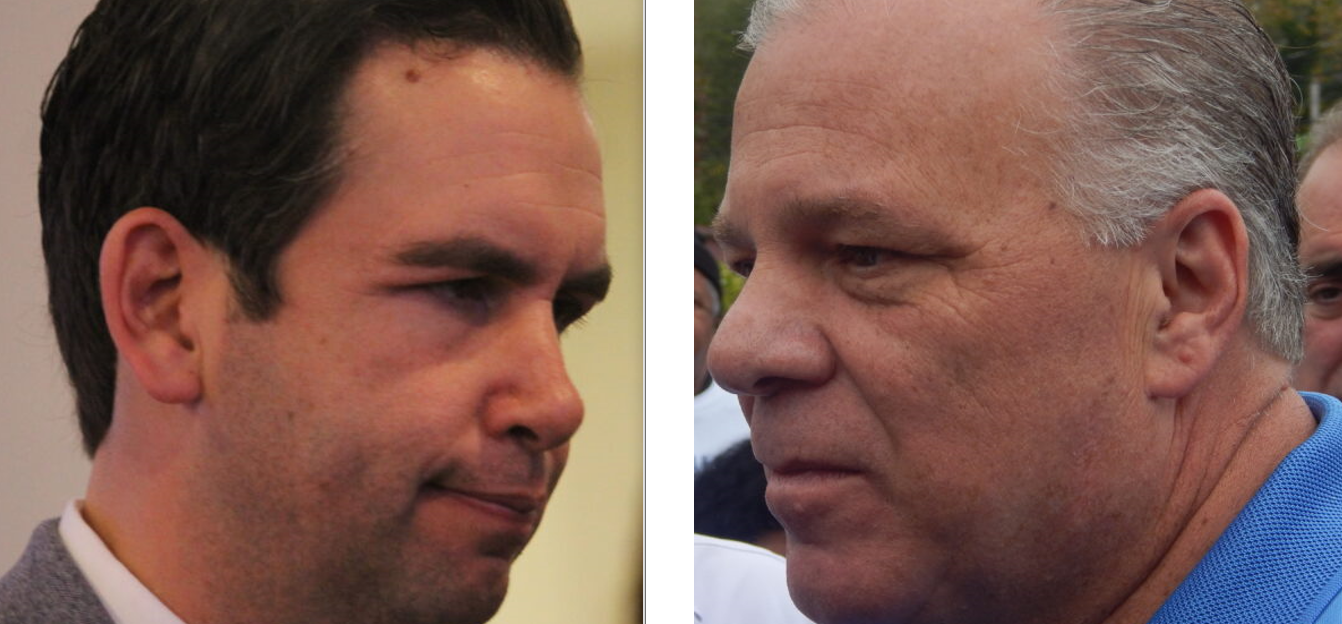
At each level of New Jersey’s ongoing political narrative, from the presidential election, to the US Senate race, to the allegedly crooked backroom deals by an elite powerbroker, it appears that there is one consistently present element: the courts. The judiciary has always played a key role in shaping the political narrative, by enabling or constraining those who would exercise power, but in an era of sound-bite attention spans and a seemingly post-satirical society, the courts play an increasingly frequent and prominent role as the last custodian of objective truth in political discourse for New Jerseyans. This chapter of New Jersey’s political history will be marked by the influence of judges and juries in a way not seen before in living memory.
When Attorney General Matt Platkin announced charges against South Jersey boss George Norcross, he dropped a bombshell on headlines around the state. Accused of racketeering and corruption, the document, some 111 pages long, alleges that Norcross has diverted New Jersey tax-payer-backed development incentives for the Camden waterfront to benefit himself and his partners, threatening those who stood in his way. Further, Norcross is accused of using his power and influence to manipulate legislation to his advantage.
Norcross himself was present for Platkin’s press conference, seated right up front, absorbing the accusations made against him in a peculiar, but clearly calculated power move.
The implications of the Norcross development will have repercussions on the New Jersey gubernatorial race. While it is too early to definitively plot out which way the waves will push the ship of state, it is worth assessing a few notable points.
Candidates should expect their connections with Mr. Norcross to come under additional scrutiny. Those with gubernatorial aspirations in particular will find themselves under the microscope to see what, if any, financial influence Norcross may have had as a donor. While Norcross, like any other American citizen, is entitled to his day in court, with the presumption of innocent-until-proven-guilty, damage to the Norcross brand has been done. If he is acquitted, one can expect Norcross to marshal his not-insignificant resources to put the attorney general in his political crosshairs. If he is found guilty, the shockwaves will be felt farther than just Camden.
Which brings us to Platkin himself. A young man, tenacious, he is also demonstrably independent. No mere extension of Governor Phil Murphy, Platkin shrugged off any perception of sitting on the governor’s knee definitively when he refused to defend “the party line” ballot arrangement, effectively snubbing the First Lady—albeit on constitutional grounds. Mrs. Murphy dropped out of the US Senate race before the Democratic primary, which Rep. Andy Kim secured over Patricia Campos-Medina and Larry Hamm. Kim now faces Curtis Bashaw, the Republican challenger.
With Platkin’s time as AG effectively dwindling, taking the chance on charging Norcross is, to say the least, bold. The stakes are high for Platkin, where a conviction over the south Jersey kingmaker could radically elevate the AG’s prospects for future higher office, or a failure to do so could bring about political repercussions that would effectively end further aspirations in state government for the foreseeable future. Platkin, however, is willing to take the chance. Without an immediate prospect of the governor’s chair, nor a legislative race to which he would naturally fit, one must conclude, however quaintly, that Platkin’s motivations are, in fact, not self-serving, but for the public good. And if Norcross is acquitted, then the process nevertheless delivered.
Ed Durr, who displaced long-time Senate President and Norcross ally Steve Sweeney, is now making a long-shot run for governor. Displaced himself by John Burzichelli, Ed Durr may seek to make political hay by rocking Sweeney-World, although it would be unlikely to expect significant capitalization, given the early timing of the 2025 race. After all, all eyes are on the Biden/Trump race which draws all the oxygen from the room for the time being.
As headlines run with stories of Trump’s legal woes, conspiracies, and court battles, presenting the United States with the novel prospect of having a convicted felon sitting in the White House bent on revenging himself on the bureaucracy of the federal government, New Jersey continues to contend with its own political headache in the form of US Senator Robert Menendez. The Democratic Party, however, to its credit, has attempted to correct for Menendez. Two episodes of federal charges and corruption was too much. Menendez was repudiated by the Democratic Party and now runs for reelection as an independent, fueled entirely on, apparently, blind hubris. Menendez was low hanging fruit, but the Democratic Party has yet to make a strong response regarding George Norcross, who, after all, is not an elected official. A sharp exception to Democratic silence, however, was found in Congresswoman Mikie Sherrill, a key Democratic contender to succeed Governor Phil Murphy, who blasted the south Jersey powerbroker in a statement.
“From Menendez to Alito to Norcross,” she said in a statement, “too many powerful people from New Jersey seem to think that they are above the law and work to enrich themselves at the expense of hard-working Americans. New Jerseyans deserve to know that their tax dollars are being spent wisely, that contracts are being awarded fairly, and that the system isn’t rigged against them. This type of corruption undermines citizens’ faith in government and costs taxpayers money. I’ve served in the Navy, as a federal prosecutor, and now in Congress. I always have and always will put the people I serve and my oath of office above all else.”
Sherrill’s statements echo those of Andy Kim when he announced his bid for US Senate immediately after Menendez landed in hot water again. Indeed, Kim’s announcement was so sudden and abrupt that he failed, intentionally or otherwise, to seek out the support of party chairs first, bypassing the machine and betting on resonating with regular New Jerseyans who have always felt that their interests were secondary to those entrusted to govern on their behalf. For Kim, it paid off, at least for now. Sherrill’s shot at Norcross, before he has even gone to trial, is a signal that she will not be labeled as an affiliate, ally, or agent of the Norcross empire and its blemished name. Sherrill, therefore, is off the Norcross Christmas card list. It remains to be seen whether or not Sherrill will see any benefit from such an early denunciation, or if Democratic lever-pullers are merely shaking their heads, preferring her to focus on matters of policy and gearing up for 2025.
As the dual political whirlpools of 2024 and 2025 gather their angular momentum with each passing day, the courtrooms, whether for the Republican presidential nominee; a politically orphaned, corrupt senator; and a political powerbroker, play an increasingly prominent role in the contests for the political soul of not only the state, but the nation as well.
(Visited 35 times, 35 visits today)
In the world of New Jersey politics, one name that has been making headlines recently is George Norcross. A powerful figure in the state’s Democratic Party, Norcross has long been a key player in shaping policy and influencing elections. However, his influence has come under scrutiny in recent years, particularly in relation to the state’s courts and the upcoming governor’s race.
Norcross, a prominent South Jersey businessman and political powerbroker, has been a central figure in New Jersey politics for decades. He has been credited with helping to elect several governors and shaping key legislation in the state. However, his influence has also been the subject of controversy, with critics accusing him of wielding too much power behind the scenes.
One area where Norcross’s influence has been particularly pronounced is in the state’s courts. As the head of a powerful law firm, Norcross has been able to exert significant influence over judicial appointments and decisions. Critics have raised concerns about the potential for conflicts of interest and the impact on the independence of the judiciary.
In recent years, Norcross’s influence over the courts has come under increased scrutiny. In 2019, a task force appointed by Governor Phil Murphy issued a scathing report accusing Norcross and his allies of engaging in a “sustained and coordinated assault” on the judiciary. The report alleged that Norcross had used his political connections to secure favorable treatment for his business interests and allies.
The controversy surrounding Norcross’s influence over the courts has also spilled over into the upcoming governor’s race. As Governor Murphy seeks reelection, he is facing a primary challenge from former Assemblyman Jack Ciattarelli, who has been critical of Norcross’s influence in state politics. Ciattarelli has called for greater transparency and accountability in the judicial appointment process, and has vowed to push for reforms if elected.
The outcome of the governor’s race could have significant implications for Norcross and his allies. If Murphy is reelected, it could signal a continuation of the status quo and further entrench Norcross’s influence over state politics. However, if Ciattarelli is successful, it could lead to greater scrutiny and potential reforms that could limit Norcross’s power.
In conclusion, George Norcross’s influence over New Jersey politics, particularly in relation to the courts and the governor’s race, has been a subject of controversy and debate. As the state prepares for a pivotal election, the role of Norcross and his allies will continue to be a key issue for voters and policymakers to consider.



